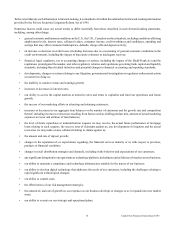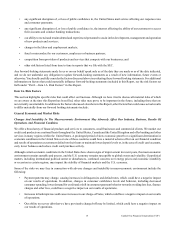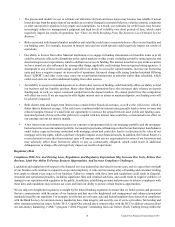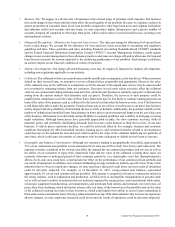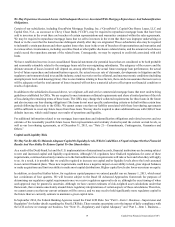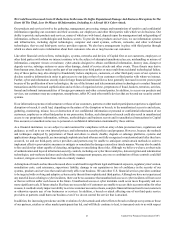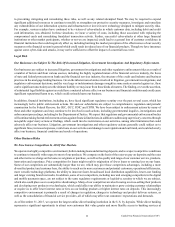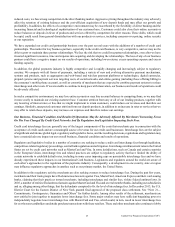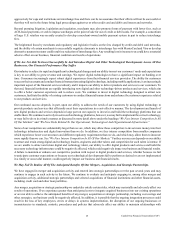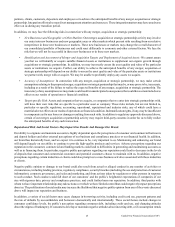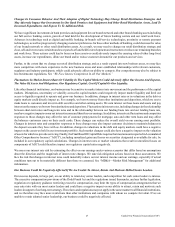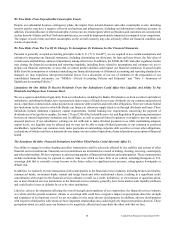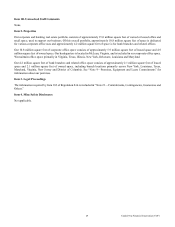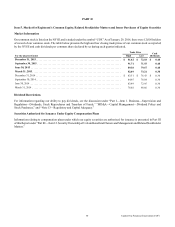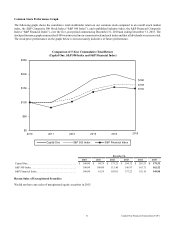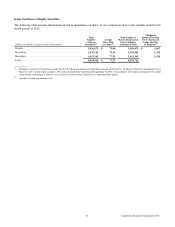Capital One 2015 Annual Report Download - page 42
Download and view the complete annual report
Please find page 42 of the 2015 Capital One annual report below. You can navigate through the pages in the report by either clicking on the pages listed below, or by using the keyword search tool below to find specific information within the annual report.23 Capital One Financial Corporation (COF)
reduced costs, we face strong competition in the direct banking market. Aggressive pricing throughout the industry may adversely
affect the retention of existing balances and the cost-efficient acquisition of new deposit funds and may affect our growth and
profitability. In addition, the effects of a competitive environment may be exacerbated by the flexibility of direct banking and the
increasing financial and technological sophistication of our customer base. Customers could also close their online accounts or
reduce balances or deposits in favor of products and services offered by competitors for other reasons. These shifts, which could
be rapid, could result from general dissatisfaction with our products or services, including concerns over pricing, online security
or our reputation.
We have expanded our credit card partnership business over the past several years with the additions of a number of credit card
partnerships. The market for key business partners, especially in the credit card business, is very competitive, and we may not be
able to grow or maintain these partner relationships. We face the risk that we could lose partner relationships, even after we have
invested significant resources, time and expense into acquiring and developing the relationships. The loss of any of our business
partners could have a negative impact on our results of operations, including lower returns, excess operating expense and excess
funding capacity.
In addition, the global payments industry is highly competitive and is rapidly changing and increasingly subject to regulatory
scrutiny. We compete with all forms of payments, including a variety of new and evolving alternative payment mechanisms,
systems and products, such as aggregators and web-based and wireless payment platforms or technologies, digital currencies,
prepaid systems and payment services targeting users of social networks and online gaming (including those offering billing to
the consumer’s mobile phone account), as well as consortia of merchants that are expected to combine payment systems to reduce
interchange and other costs. If we are unable to continue to keep pace with innovation, our business and results of operations could
be adversely affected.
In such a competitive environment, we may lose entire accounts or may lose account balances to competing firms, or we may find
it more costly to maintain our existing customer base. Customer attrition from any or all of our lending products, together with
any lowering of interest rates or fees that we might implement to retain customers, could reduce our revenues and therefore our
earnings. Similarly, unexpected customer attrition from our deposit products, in addition to an increase in rates or services that we
may offer to retain those deposits, may increase our expenses and therefore reduce our earnings.
Our Business, Financial Condition And Results Of Operations May Be Adversely Affected By Merchants’ Increasing Focus
On The Fees Charged By Credit Card Networks And By Regulation And Legislation Impacting Such Fees.
Credit card interchange fees are generally one of the largest components of the costs that merchants pay in connection with the
acceptance of credit cards and are a meaningful source of revenue for our credit card businesses. Interchange fees are the subject
of significant and intense global legal, regulatory and legislative focus, and the resulting decisions, regulations and legislation may
have a material adverse impact on our overall business, financial condition and results of operations.
Regulators and legislative bodies in a number of countries are seeking to reduce credit card interchange fees through legislation,
competition-related regulatory proceedings, central bank regulation and or litigation. Interchange reimbursement rates in the United
States are set by credit card networks such as MasterCard and Visa. In some jurisdictions, such as Canada and certain countries
in the European Union, interchange fees and related practices are subject to regulatory activity that have limited the ability of
certain networks to establish default rates, including in some cases imposing caps on permissible interchange fees and we have
already experienced these impacts in our International Card business. Legislators and regulators around the world are aware of
each other’s approaches to the regulation of the payments industry. Consequently, a development in one country, state or region
may influence regulatory approaches in another, such as our primary market, the United States.
In addition to this regulatory activity, merchants are also seeking avenues to reduce interchange fees. During the past few years,
merchants and their trade groups have filed numerous lawsuits against Visa, MasterCard, American Express and their card-issuing
banks, claiming that their practices toward merchants, including interchange and similar fees, violate federal antitrust laws. In
2005, a number of entities filed antitrust lawsuits against MasterCard and Visa and several member banks, including our subsidiaries
and us, alleging among other things, that the defendants conspired to fix the level of interchange fees. In December 2013, the U.S.
District Court for the Eastern District of New York granted final approval of the proposed class settlement. See “Note 21—
Commitments, Contingencies, Guarantees and Others” for further details. Among other results of the settlement, merchants are
now entitled to join together to negotiate lower interchange fees. Some major retailers may have sufficient bargaining power to
independently negotiate lower interchange fees with MasterCard and Visa, which could, in turn, result in lower interchange fees
for us when our cardholders undertake purchase transactions with these retailers. These and other merchants also continue to lobby



